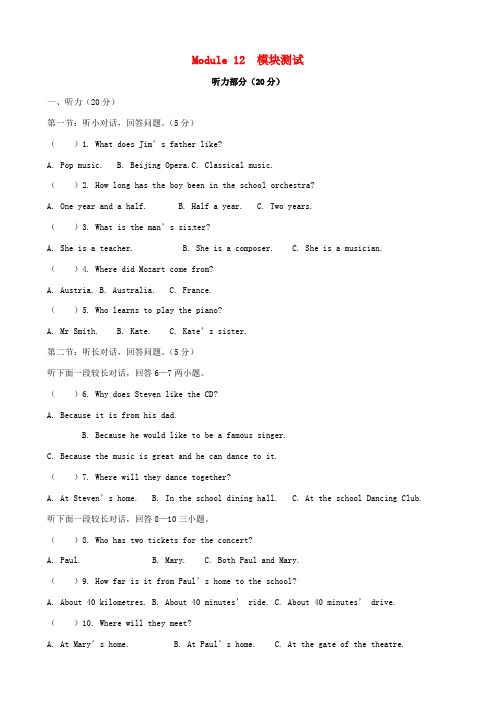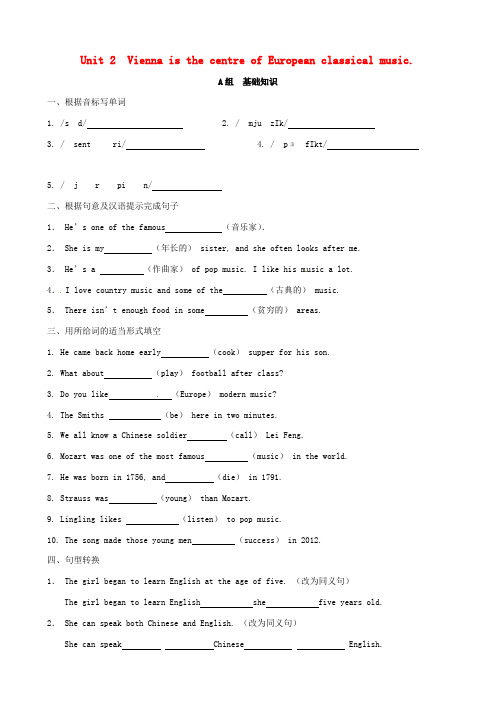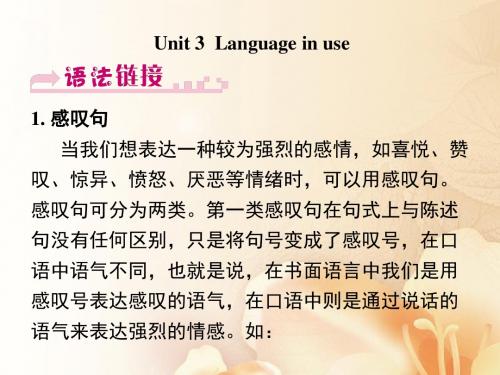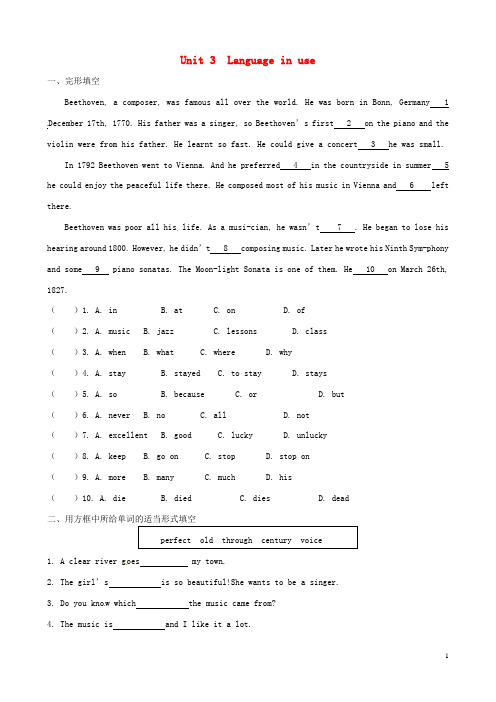浙江省嘉兴市秀洲区七年级英语下册Module12WesternmusicUnit1It’ssobeautiful课件新版外研版201804021165
浙江省嘉兴市秀洲区七年级英语下册 Module 12 Western music测试 (新版)外研版

Module 12 模块测试听力部分(20分)一、听力(20分)第一节:听小对话,回答问题。
(5分)()1. What does Jim’s father like?A. Pop music.B. Beijing Opera.C. Classical music.()2. How long has the boy been in the school orchestra?A. One year and a half.B. Half a year.C. Two years.()3. What is the man’s sis ter?A. She is a teacher.B. She is a composer.C. She is a musician.()4. Where did Mozart come from?A. Austria.B. Australia.C. France.()5. Who learns to play the piano?A. Mr Smith.B. Kate.C. Kate’s sister.第二节:听长对话,回答问题。
(5分)听下面一段较长对话,回答6—7两小题。
()6. Why does Steven like the CD?A. Because it is from his dad.B. Because he would like to be a famous singer.C. Because the music is great and he can dance to it.()7. Where will they dance together?A. At Steven’s home.B. In the school dining hall.C. At the school Dancing Club. 听下面一段较长对话,回答8—10三小题。
()8. Who has two tickets for the concert?A. Paul.B. Mary.C. Both Paul and Mary.()9. How far is it from Paul’s home to the school?A. About 40 kilometres.B. About 40 minutes’ ride.C. About 40 minutes’ drive.()10. Where will they meet?A. At Mary’s home.B. At Paul’s home.C. At the gate of the theatre.第三节:听独白,完成信息记录表。
(浙江专版)七年英语下册Module12WesternmusicPeriod4Unit2Vienna

B. 80.
C. More than 80.
D. More than 100.
写无定法, 写必有法 ◆“三步法”描述著名人物
第一步: 介绍姓名及人物生平; 第二步: 描述主要成就; 第三步: 自己的想法和希望。
◆素材积累(词汇、句型大搜罗) 1. 描述著名人物类话题的常用词汇
favourite, be born, one of, not only…but also… 2. 描述著名人物类话题的常用句型
(1) …is one of the greatest… (2) We should…
◆典例 肖邦是一位很伟大的作曲家。请根据下面的提
示内容, 以 “Chopin — a great musician”为题, 写一篇关 于肖邦的介绍文章。
姓名
Chopin
人物生平
1810年出生于波兰(Poland) , 1849年于巴黎去世, 享年39岁。
Then he __t_o_o_k___ 8(带) his work to the owner of the restaurant. He only received a dish of beef and potatoes for it.
Thirty years after his death, this piece of music of thworth 40, 000 francs. It was played in many big theatres and all the people loved it. Schubert became _f_a_m__o_u_s_10(著名的) all over the world.
5. The old man was ninety-five years old when he died. (对画线部分提问) ___H__o_w__ ___o_ld____ was the old man when he died?
浙江省嘉兴市秀洲区七年级英语下册 Module 12 Western music Unit 2 Vi

Unit 2 Vienna is the centre of European classical music.A组基础知识一、根据音标写单词1. /s d/2. /mju zIk/3. /sent ri/4. /pзfIkt/5. /j r pi n/二、根据句意及汉语提示完成句子1. He’s one of the famous (音乐家).2. She is my (年长的) sister, and she often looks after me.3. He’s a (作曲家) of pop music. I like his m usic a lot.4. I love country music and some of the (古典的) music.5. There isn’t enough food in some (贫穷的) areas.三、用所给词的适当形式填空1. He came back home early (cook) supper for his son.2. What about (play) football after class?3. Do you like (Europe) modern music?4. The Smiths (be) here in two minutes.5. We all know a Chinese soldier (call) Lei Feng.6. Mozart was one of the most famous (music) in the world.7. He was born in 1756, and (die) in 1791.8. Strauss was (young) than Mozart.9. Lingling likes (listen) to pop music.10. The song made those young men (success) in 2012.四、句型转换1. The girl began to learn English at the age of five. (改为同义句)The girl began to learn English she five years old.2. She can speak both Chinese and English. (改为同义句)She can speak Chinese English.3. Lisa is two years younger than him. (改为同义句)He is two years Lisa.4. Do you like apples? (用bananas改为选择疑问句)? 5.(上海中考)Our journey to Britain last summer was wonderful. (改为感叹句)our journey to Britain last summer was!B组能力提升一、完形填空Robby was 11 years old when his mother sent him to have his first 1 lesson. Robby said it was 2 mother’s dream to hear him 3 the piano. So I took him 4 my student.Robby tried very hard, 5 he was not good at music. He learnt hard and 6 the end of each weekly lesson he’d always say, “My mum is going to hear me play one day.” But it seemed 7 to make his dream 8 . He didn’t have a talent for music.One day, Robby 9 coming to our lessons. He told me that his mum was sick and 10 to take him to piano lessons, but he was still 11 . He told me he wanted to 12 my concert and I agreed.The night of the concert came. The high school gym was filled with parents, friends and relatives. The concert was going well. Then Robby came up on the stage, and began to play the piano.He played 13 well!Everyone was on their feet, clapping(鼓掌) excitedly. In tears, I ran up on the stage, “Oh, Robby! 14 did you do it?”“Well, Miss Green, do you remember I told you my mum was sick? Well, actually she had cancer and died this morning. And well...she was born deaf, so tonight was the best time for 15 to hear me play the piano. I wanted to make it special.”()1. A. football B. piano C. drum D. dance()2. A. his B. he C. him D. himself()3. A. play B. plays C. playing D. played()4. A. with B. for C. in D. as()5. A. and B. but C. or D. so()6. A. in B. by C. to D. at()7. A. hard B. easy C. possible D. cool()8. A. come true B. come back C. take place D. work out()9. A. began B. finished C. stopped D. started()10. A. unable B. able C. can D. may()11. A. looking B. waiting C. practising D. shouting()12. A. take part in B. taking part in C. takes part in D. tookpart in()13. A. so B. such C. even D. too()14. A. Why B. How C. What D. When()15. A. they B. he C. her D. we二、根据短文内容及汉语提示完成短文Franz Schubert(弗朗兹·舒伯特) was a famous 1 (音乐家) in the world. But hewas very 2 (贫穷的) and often had nothing to eat.One day he was very 3 (饥饿的) and went to a small restaurant, hoping he mightmeet some friends there to 4 (借) some money. He looked 5 (环绕) the restaurant but found nobody. Then his eyes fell on a 6 (张) of paper on one of thetables. On it was a short poem. He read the poem and liked it very much. So he sat down and 7 (开始) to write a piece of music for the poem. Then he 8 (带) his work to the ownerof the restaurant. He only received a dish of beef and potatoes for it.Thirty years after his death, this music of the poem 9 (由……创作) Schubert wasworth 40,000 francs. It was played in many big theatres and a ll the people loved it. Schubertbecame 10 (著名的) all over the world.三、语法填空阅读下面短文,按照句子结构的语法性和上下文连贯的要求,在空格处填入一个适当的词或使用括号中词语的正确形式填空(每空不多于2个单词)。
浙江省嘉兴市秀洲区七年级英语下册Module12WesternmusicUnit3Languageinuse课件新版外研版201804021167

①It’s so beautiful! 真美啊! ②I love his music! 我喜欢他的音乐! ③Happy birthday, Tom! 生日快乐,汤姆!
④I am so angry!
我太生气了!
在英文中还有一种专门表达感叹的句式。它们由 what和how引导。 (1)由what引导的感叹句:what(多么)用作定语, 修饰名词(被强调部分),单数可数名词前要加不
照反意疑问句的表达方式,尽管前面是肯定的形式,
疑问部分仍然是肯定疑问形式。 ②陈述句部分如果有表示否定意思的词,如:
hardly, never, little, few等,疑问部分要用肯定形式。
如:
They have never visited his home, have they?
他们从来没有到他家玩过,是吧?
定冠词a/an;复数可数名词或不可数名词前不用冠词。
句子的主谓部分经常会被省略掉。 (2)由how引导的感叹句:how(多么)作状语, 修饰形容词或副词(被强调部分)。如果how修饰形 容词,则句中的谓语动词用系动词;如果how修饰副
词,则句中的谓语动词用行为动词。
结构式为:
①What+a/an+adj.+单数名词(+主语+谓语)!如: What a nice picture (it is)!
(2)特殊疑问句+选择对象一+or+选择对象二? 如:
①Which is Lily, the tall one or the short one?
哪一个是莉莉,高的那个还是矮的那个? ②Where are you, at home or at school? 你在哪里,在家还是在学校?
浙江省嘉兴市秀洲区七年级英语下册 Module 12 Western

Unit 3 Language in use一、完形填空Beethoven, a composer, was famous all over the world. He was born in Bonn, Germany 1 December 17th, 1770. His father was a singer, so Beethoven’s first 2 on the piano and the violin were from his father. He learnt so fast. He could give a concert 3 he was small.In 1792 Beethoven went to Vienna. And he preferred 4 in the countryside in summer 5 he could enjoy the peaceful life there. He composed most of his music in Vienna and 6 left there.Beethoven was poor all his life. As a musi-cian, he wasn’t 7 . He began to lose his hearing around 1800. However, he didn’t 8 composing music. Later he wrote his Ninth Sym-phony and some 9 piano sonatas. The Moon-light Sonata is one of them. He 10 on March 26th, 1827.()1. A. in B. at C. on D. of()2. A. music B. jazz C. lessons D. class()3. A. when B. what C. where D. why()4. A. stay B. stayed C. to stay D. stays()5. A. so B. because C. or D. but()6. A. never B. no C. all D. not()7. A. excellent B. good C. lucky D. unlucky()8. A. keep B. go on C. stop D. stop on()9. A. more B. many C. much D. his()10. A. die B. died C. dies D. dead二、用方框中所给单词的适当形式填空perfect old through century voice1. A clear river goes my town.2. The girl’s is so beautiful!She wants to be a singer.3. Do you kno w which the music came from?4. The music is and I like it a lot.5. The boy in a white shirt over there is my brother.三、根据短文内容及汉语提示完成短文Jack Johnson is a 1 (受欢迎的) singer-songwriter in the world. He was b orn2 (在) May 18th, 1975 in Hawaii. When he was young, he had an 3 (兴趣) in surfing,but an accident4 (改变) his life. He started to pract ise5 (演奏) the guitar in the hospital.After he entered the university, he wrote songs and 6 (唱) songs for his teachers andfriends. His7 (第一) music album came out in 2001. Later, Jack had lots of 8 (音乐会) in and out of America. He became famous all over the world. Jack is 9 (成功的). His music makes you feel like lying on the beach 10 (享受) the warm sunshine.In his songs we can find his secret of success.四、语法填空阅读下面短文,按照句子结构的语法性和上下文连贯的要求,在空格处填入一个适当的词或使用括号中词语的正确形式填空(每空不多于2个单词)。
- 1、下载文档前请自行甄别文档内容的完整性,平台不提供额外的编辑、内容补充、找答案等附加服务。
- 2、"仅部分预览"的文档,不可在线预览部分如存在完整性等问题,可反馈申请退款(可完整预览的文档不适用该条件!)。
- 3、如文档侵犯您的权益,请联系客服反馈,我们会尽快为您处理(人工客服工作时间:9:00-18:30)。
不和谐的嘈杂声。如:
Don’t make any noise here. 不要在这儿制造噪音。 noise的形容词形式为noisy,意为“吵闹的”。如: Rock music is so noisy.
摇滚音乐真是太吵了。
3. through prep. 穿过
【点拨】through常与go, walk等动词连用,表示“穿
Module 12 Western music Unit 1 It’s so beautiful!.
1. by prep. 被,由 【点拨】by是很常用的介词。在初中阶段,主要 有以下几种用法: (1)意为“在……旁”。如: Some boys are drawing by the lake.
一些男孩在湖边画画。
你的表几点了?
(6)和take,hold等动词连用,说明接触身体的某 一部分。如: I took him by the hand. 我拉住了他的手。
(7)表示“被”、“由”等。如:
①English is spoken by many people. 英语被许多人所说。 ②The passage by Wang Ling is popular in our class. 王玲写的这篇文章在我们班很受欢迎。 by的相关短语有:by the way顺便说一下,顺便问 一下;by oneself单独,自行;day by day一天天地; one by one一个个地。
past
4. both pron. 两个;两者
【点拨】both of后接复数名词或代词,名词前加
the或形容词性物主代词,如:both of my parents (我父母都)。如: ①Both of them are my good friends. 他们两个都是我的好朋友。
②They both enjoy pop music.
laughed. 猴子用尾巴吊在树上哈哈大笑。 ②The boy’s father taught him how to write a letter by email.
男孩的父亲通过电子邮件教他如何写信。
(4)表示“逐个,逐批”的意思。如:
One by one they went past the table in the dark. 他们一个一个地在黑暗中经过这张桌子。 (5)表示“根据,按照”的意思。如: What time is it by your watch?
over 意为“越过;跨越”,强调从某物的正上 方跨越。如:The cat jumps over the wall to play every day. 这只猫每天跳过墙去玩。 意为“经过;超过”,强调从某人或某物 的旁边经过。如:He is walking past the post office.他正从邮局旁边走过。
大明和托尼都不喜欢滑雪。
【注意】(1)both...and...意为“……和…… 都……”,作主语时看作复数。 neither...nor...意为“……和……都不……”,作主
语时谓语动词的数遵循就近原则,即谓语动词的数
与离它最近的词的单复数保持一致。
either...or...意为“要么……要么……”,作主语时
2. sound n. 声音 【点拨】sound作名词,意为“声音”。 【辨析】sound, voice与noise (1)sound泛指可以听到的“声音”。如: ①Light goes faster than sound. 光比声音传播得快。 ②In English, “qu” makes a /kw/ sound. 英语中,字母组合“qu”的发音为/kw/。 (2)voice指说话和唱歌的“嗓音”,有时也指鸟鸣 的声音。如: They talked in a loud voice. 他们高声谈话。
(透)过”。如: ①The Danube goes through Vienna. 多瑙河流经维也纳。 ②The sunlight shines in through the glass.
阳光透过玻璃照进来。
【辨析】through, across, over与past
through 意为“穿过;通过”,强调从内部空间穿 过。如:There is a river running through the city. 有一条河流经过这座城市。 across 意为“穿过”,强调从某个平面的一边到 另一边。如:Walk across the street, and you’ll see it. 穿过这条街,你就会看到它。
(2)意为“不迟于,到……时为止”。如:
Your son will be all right by lunch time. 你的儿子在午饭前会好的。 (3)表示方法、手段,可译作“用,凭借,通过, 乘坐”等。如:
①The monkey hung from the tree by his tail and
我和朋友们都喜欢打篮球。
(2)both是具有肯定意义的词汇,与not连用时表示 部分否定,意为“不都……”。用neither表示完全 否定。如: ①Daming and Tony don’t both like skiing.
大明和托尼不都喜欢滑雪(有一人不喜欢)。
②Neither Daming nor Tony likes skiing.
【注意】voice是可数名词,其复数形式为voices。
如:
Staying in the fooices of animals. 晚上待在森林里,你能听见各种动物不同的声音。
(3)noise意为“噪音;喧闹声”,常指不悦耳、
他们两个都喜欢流行音乐。 ③My parents are both doctors. 我的父母都是医生。
【延伸】(1)both还可以是连词。常用词组有 both...and...,意为“……和……都……”。如: Both my friends and I like playing basketball.
